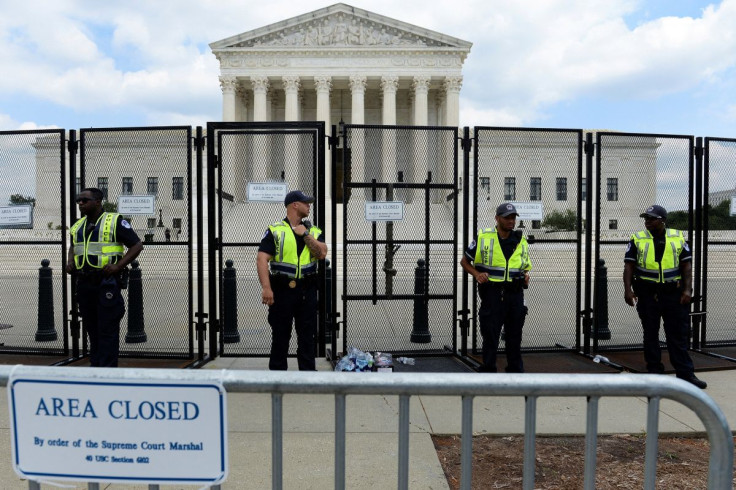Analysis-Conservative U.S. Justices Show Maximalism On Guns And Abortion

The U.S. Supreme Court's blockbuster rulings on successive days that eliminated the right to abortion nationwide and widened the rights of gun owners illustrate how its expanded conservative majority is willing to boldly assert its power.
In both rulings, the conservative justices delivered long-sought victories to activists on the right who have decried the 1973 Roe v. Wade ruling that legalized abortion and believe the court has been slow to broaden gun rights.
The increasingly unrestrained court has become ever more willing to take up and decisively rule on contentious issues since the 2020 addition of former President Donald Trump's third appointee, Amy Coney Barrett, gave the nation's top judicial body a 6-3 conservative majority.
Her appointment changed the court's dynamics by marginalizing Chief Justice John Roberts, making it possible for its conservative bloc to amass the five votes needed to decide cases without him. Roberts is considered more of an incrementalist conservative.
Barrett and Trump's two other appointees, Neil Gorsuch and Brett Kavanaugh, were in the majority in the gun ruling on Thursday and the abortion decision on Friday.
The conservative majority may endure for years - possibly decades - and has signaled interest in other big changes to the law. The court has taken up a case to be argued in its next term, which starts in October, that could end university policies considering race in student admissions that have been used to promote campus diversity. Ending such affirmative action policies has been another coveted goal of conservatives.
TRUMP'S APPOINTEES
Chicago-Kent College of Law Professor Carolyn Shapiro, a former law clerk for liberal Justice Stephen Breyer, expressed concern that the conservative majority is out of step with the American people. Shapiro noted that Trump was able to make three appointments despite failing to win the popular vote in the 2016 elections and that Republican senators pushed through the nominations on razor-thin majority votes.
"The makeup of the court has historically been healthier when it more closely reflects the makeup and views of the American people," Shapiro said.
Reuters/Ipsos polling indicates that a majority of Americans support abortion rights and believe that the easy availability of firearms is a reason why there are many mass shootings.
"The court is doing things that I think are dangerous for the country, dangerous for the right of individuals, dangerous for democracy and dangerous for its continued legitimacy," Shapiro added.
Before conservative Justice Antonin Scalia's 2016 death and the subsequent addition of Trump's appointees, the court had been more cautious in deciding what types of cases to hear.
It had a 5-4 conservative majority. But one of the conservatives, Justice Anthony Kennedy, sometimes sided with the liberals on contentious "culture war" issues including abortion, affirmative action and LGBT rights. That led to the court sometimes avoiding contentious cases or considering disputes with lower stakes.
Jennifer Mascott, a professor at George Mason University's Antonin Scalia Law School who clerked for conservative Justice Clarence Thomas, rejected the notion that the court is dominated by judicial activists. Mascott said in the abortion case, the court did not outlaw the procedure, but instead let states legislate as they see fit.
"It is removing itself from the process. It is not telling states what to do," Mascott said.
The role of Roberts, who has sought to defend the court as an institution and has avoided dramatic moves, has been diminished. Roberts joined the majority in full in the gun case. In the abortion case, he agreed with the majority on upholding the Mississippi ban on abortion at 15 weeks of pregnancy at issue in the case but not in overturning Roe.
The court's energetic involvement in issues of nationwide importance extends beyond abortion and guns, as illustrated by the upcoming college admissions case.
In the coming term, it will also hear a major new legal fight pitting religious beliefs against LGBT rights in a case involving an evangelical Christian web designer's free speech claim that she cannot be forced under a Colorado anti-discrimination law to produce websites for same-sex marriages.
The justices still have seven cases to decide before the current term concludes by the end of the month including one involving a public high school football coach who prayed on the field with players after games - a ruling that could favor religious rights. In another, the court could curb the ability of President Joe Biden's administration to combat climate change.
The climate case is an example of one target for the conservative justices: the power of federal agencies in what has been dubbed a "war on the administrative state." For example, the court in January blocked the Biden administration's COVID-19 vaccination-or-testing mandate for companies with at least 100 employees, saying the agency behind the order lacked the necessary authority.
Before Kennedy retired, the court was already supportive of religious challenges. That has deepened since then including rulings backing religious groups challenging pandemic-related restrictions in 2020. The court on June 21 further reduced the separation of church and state in a ruling that endorsed more public funding of religious entities. The football coach ruling could add to that trend.
© Copyright Thomson Reuters 2024. All rights reserved.











